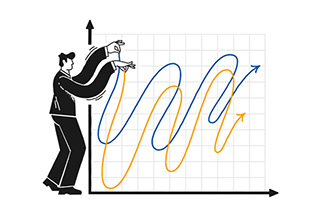A Better World
Written by Judy McKinnon | Published on February 7, 2020
Written by Judy McKinnon | Published on February 7, 2020
When Melanie Adams was just 11 years old, she was already thinking about big-picture impact when deciding what to do with her money. “I had a club with a friend where we raised money through lemonade stands and craft sales to sponsor an acre of rainforest,” she remembers.
Fast-forward and Adams has made a career out of what we now call responsible investment. As the head of RBC Global Asset Management's responsible investment operations, she continues to draw on those early days for inspiration.
“Responsible investment is something that I do truly believe in. I don't think you can be in this space and only do it partway,” she says. With climate change top of mind globally, responsible investment has been gaining traction in recent years. We sat down with Adams to find out what this means for investors.
Q. What does investing responsibly really mean?
A. We consider responsible investment as an umbrella term. Under that fall three broad categories: ESG (environmental, social and governance) integration, socially responsible investing and impact investing.
Q. Can you tell me more about the three responsible investment categories?
A. Sure. With ESG integration, you look at how a particular company is managing the risks and opportunities related to each of these three factors and whether or not this is reflected in the share price. This is done to help inform the investment decision. Some ESG considerations include:
Socially responsible investing, on the other hand, is when you're aligning your values with how you invest, screening out companies or sectors that don't match your beliefs. Alternatively, some investors screen in certain sectors such as renewable energy. Some common negative screens include military weapons, alcohol, gambling and tobacco.
Finally, impact investing means investing for a measurable social or environmental impact as well as a financial return. An example might be investing in an organization that provides low-income housing to families in need.
Q. Why do you think there is an increased focus on responsible investing?
A. Investors are increasingly understanding that non-financial factors can have an impact on a company's financial performance. Studies show that companies with good governance, and that manage their environmental and social risks, will perform better financially. There have also been studies that show women and millennials are a large part of the driving force behind investors caring more about responsible investing.
Q. What kinds of questions should investors be asking?
A. With ESG specifically, it really depends on what's relevant to the company and the industry it operates in. If you're looking at a food and beverage company, for example, you would want to look at water usage and wastewater management. Or in the case of oil and gas companies, are they investing in clean technology or research and development? One way to get a real sense of what companies are doing is to compare them against their peers. You also want to determine if a company has good governance over its ESG factors. That means checking to see if they have robust policies and procedures in place to address material issues that may arise, which could be anything from environmental contamination to employee health and safety matters.
Q. How can individual investors do their own research?
A. Investors can visit a company's website to look at annual reports and other corporate reports. For example, investors can review the board of directors to see if there's the appropriate level of gender diversity. Or, do they have a plan to deal with the impacts of climate change on the business? Many companies are starting to come out with specific ESG reports. You can also find other great resources online, such as Canada's Responsible Investment Association, the United Nations–supported Principles for Responsible Investment (PRI), and the Sustainability Accounting Standards Board (SASB).
Q. Who is responsible investing for?
A. I think all investors should be thinking about ESG factors. It used to be that earnings were the most important factor in assessing a company's value, but now we know that non-financial factors make up a greater proportion of a company's value. That may be due in part to the internet and social media, which allow quick public reactions that can impact share prices. It's important to remember that it can be challenging to measure these non-financial factors, which include ESG risks and opportunities. As an investor, you need to give yourself the time to do the research and talk to knowledgeable people to get more comfortable in the space, but responsible investors agree that it's well worth the effort.
RBC Direct Investing Inc., RBC Global Asset Management Inc. and Royal Bank of Canada are separate corporate entities which are affiliated. RBC Direct Investing Inc. is a wholly owned subsidiary of Royal Bank of Canada and is a Member of the Investment Industry Regulatory Organization of Canada and the Canadian Investor Protection Fund. Royal Bank of Canada and certain of its issuers are related to RBC Direct Investing Inc. RBC Direct Investing Inc. does not provide investment advice or recommendations regarding the purchase or sale of any securities. Investors are responsible for their own investment decisions. RBC Direct Investing is a business name used by RBC Direct Investing Inc. ® / ™ Trademark(s) of Royal Bank of Canada. RBC and Royal Bank are registered trademarks of Royal Bank of Canada. Used under licence. © Royal Bank of Canada 2020. All rights reserved.
The views and opinions expressed in this publication are for your general interest and do not necessarily reflect the views and opinions of RBC Direct Investing. Furthermore, the products, services and securities referred to in this publication are only available in Canada and other jurisdictions where they may be legally offered for sale. If you are not currently resident of Canada, you should not access the information available on the RBC Direct Investing website.

Here’s what we saw on the trading floor in May 2025

When markets swing, how you place a trade can make a difference

Here’s what we saw on the trading floor in April 2025